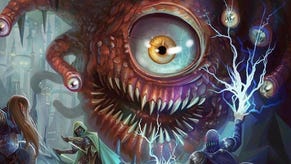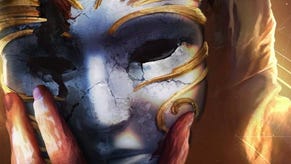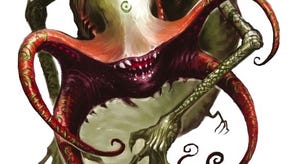Planescape Torment
Dark fantasy RPG reviewed
Bedtime Stories
One of the surprise hits of 1998 was Baldur's Gate, an old school isometric RPG based on the Advanced Dungeons & Dragons rule set.
With over a million copies shipped worldwide, it's perhaps no surprise that the game has produced a whole horde of successors, including an expansion pack (Tales Of The Sword Coast) and a sequel (Shadows Of Amn).
Planescape Torment is the latest of the spawn of Baldur's Gate, an all-new game which shares the AD&D rules and the Infinity graphics engine with Baldur's Gate, but precious little else...
Whereas Baldur's Gate was set in a reassuringly familiar fantasy world of elves, healing potions, bandits and wands, Planescape Torment has an altogether darker, almost science fiction feel to it. Robots, fallen angels, floating skulls and magical tattoos are the order of the day.
You play "The Nameless One", a mysterious character who wakes up on a dissection table in a mortuary with no memory of who he is or how he came to be there. His only companion is a sarcastic and abusive floating skull called Morte.
As the game progresses you will find out more about who you really are, how you got all those scars, what you were doing in a mortuary, and why somebody has carved a message into your back!
Along the way you will expand your party to include up to six characters, which can include a mage wreathed in fire, a girl with a tail, and a winged priestess amongst other bizarre characters.
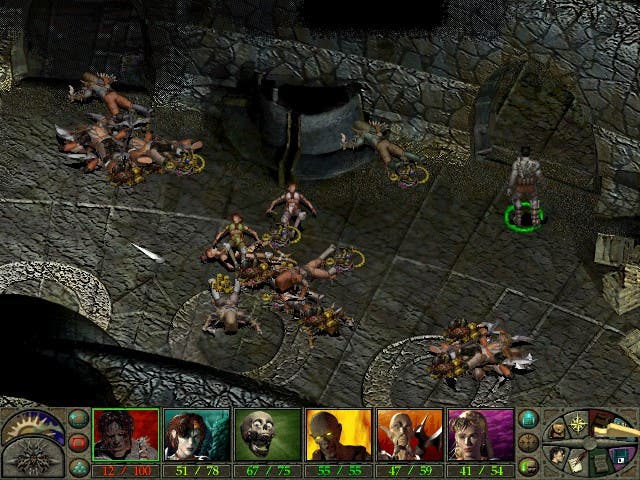
Death Is Not The End
You will also discover that you are immortal - every time you are killed you spring back to life. And this is the first of Planescape Torment's problems, as it cheapens death.
It doesn't matter if you die, because the Nameless One will simply get back up again with full hit points. You don't even lose any stats, experience, or items like you would in a massively multiplayer RPG like Asheron's Call.
In fact there's no penalty at all, and dying is not only nothing to be feared, it can often bring advantages (besides healing you). Whenever you come back to life again you are instantly transported to a particular spot on that level, and sometimes to a completely different level. At times getting the Nameless One killed can actually prove to be an useful shortcut or escape mechanism!
Inexplicably, even if you are surrounded by a horde of enemies when you die, you still get resurrected at that same spot in the map, and with all the other characters in your party standing around waiting for you to revive. Needless to say this rather spoils the "suspension of disbelief" that all games, but particularly RPGs, depend on to suck you in.
Other characters dying can be a pain, but given that the Nameless One develops the ability to "Raise Dead" up to three times a day early on in the game, it is more of a nuisance than anything else.
This approach to death may appeal to some people, but for me it made the lives of my characters rather cheap and meaningless. They were just cannon-fodder, and no matter how many times they died I could always bring them back.
And you will find yourself dying a lot, because the game is bloody hard! Baldur's Gate took something of a hack 'n' slash approach to role-playing, but Planescape Torment is (in places) even worse. Although at times it is a true role playing game, and even bordering on being an adventure game in places, other areas are packed full of dozens of powerful and very hostile creatures.
At the beginning of the game you are often heavily outnumbered and outclassed by your enemies. Later on in the game you are just outnumbered, and killing them all becomes tedious rather than dangerous... This is especially true in the final stages of the game.
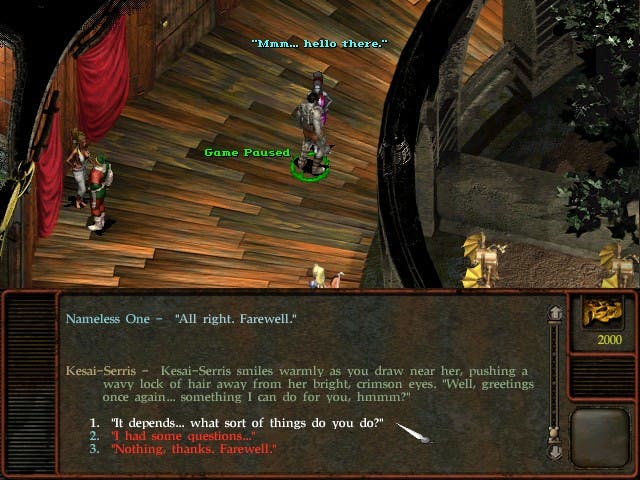
Endless Nameless
It's not all about combat though, and Planescape Torment does have a lot of tasks and side quests to keep you busy.
The world of Planescape Torment is basically split into two types of people - characters, and by-standers. It generally pays to talk to all the "characters" (ie, everybody who has an individual name), and go through every branch of their conversation "tree", selecting every option you are given while talking to them.
In doing so you will get a lot of information (some of it useless, some of it distracting, and some of it vital to your progress through the game), all of which gets entered into your journal. "Quests" warrant their own list, which is split into quests you have been assigned and ones you have completed.
Apart from occasional breakdowns where a quest I had already completed remained on my to-do list, this is a very useful system for keeping track of what you are doing and reminding yourself of what you have already accomplished.
There are some cases where the quests can be broken though, most often by completing a quest before you have even been assigned it. For example, sometimes you will talk to a character and they will say "Oh, you brought me the *whatever* I wanted", and suddenly you lose whatever the key item was and get the experience bonus for completing the quest, all without ever knowing what you were supposed to be doing in the first place...
The biggest problem with the quest system though is the amount of experience that you get for carrying out certain tasks. All of the quests bring rewards, and although at the beginning of the game these are generally fairly small (a few hundred or thousand XP), towards the end the game is routinely throwing you 300,000 XP or more just for talking to another character!
Because you don't have to work for it you don't appreciate it as much, and it just skews and cheapens the whole experience system. Why waste hours slaying dozens of monsters or carrying out complicated subquests, when you can get ten times as much XP just by talking to a complete stranger for a couple of seconds?
This kind of thing happens all too often, and although it makes sense that you should get more experience towards the end of the game, the change is rather sudden, and the XP values seem to have been assigned to different tasks at random rather than according to how difficult or important they are.
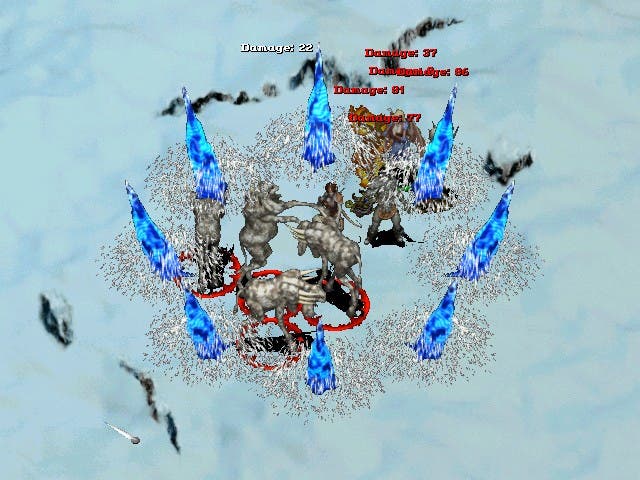
Always Look On The Bright Side Of Life
There's no denying though that Planescape Torment is a huge, addictive, good-looking, and refreshingly adult RPG. And when I say "adult", that doesn't just mean that the women wear less clothes, the language is coarser, and there is a surplus of gore .. although all three are true!
The storyline is genuinely interesting, and keeps the game moving along at a fair pace most of the time. You will explore the city of Sigil (in which you start), as well as a number of other "planes" of existence, taking in hell, a prison city, and a pillar of talking skulls along the way!
The rendered cinematics are few and far between, but are the best I've seen in a game for a long time. The in-game cinematics are also very well done, though it is annoying that you can't skip them, and you have to wonder if lack of time and money is behind the way they are sometimes accompanied by proper voice acting, and sometimes just text on the screen, often mixing the two within a single cut-scene.
The characters are interesting and there is tension, suspicion, and even romance between them lurking under the surface. Sadly the fact that they can't be killed makes them rather less emotionally involving than they could have been, but they are certainly a refreshing change from your usual stock heroes.
The engine is rather dated now - 640x480 at 16 bit colour is hardly state of the art! But the backgrounds are excellently drawn in general, and the characters (although they are merely two dimensional animated sprites) are big, colourful, and .. well .. full of character.
Spell effects are gloriously over the top, and many of them look incredible. They can get a little annoying by the end of the game though, as often the game will freeze for up to several seconds as the spell takes effect. The first time you see a chain lightning spell in action it is gob-smacking. The tenth time it is merely a distraction.
The pathfinding abilities of your characters has improved noticeably since Baldur's Gate as well. I don't know whether that is down to better level design, improved AI, or a bit of both, but it's certainly welcome! Your party still gets stuck in doorways and tight passages occasionally, but generally they can get from A to B without needing their hands holding every step of the way.
As for the music, my only complaint is that there isn't enough of it! What there is of it is excellent though - it adds to the atmosphere, and fits the mood of the game perfectly.
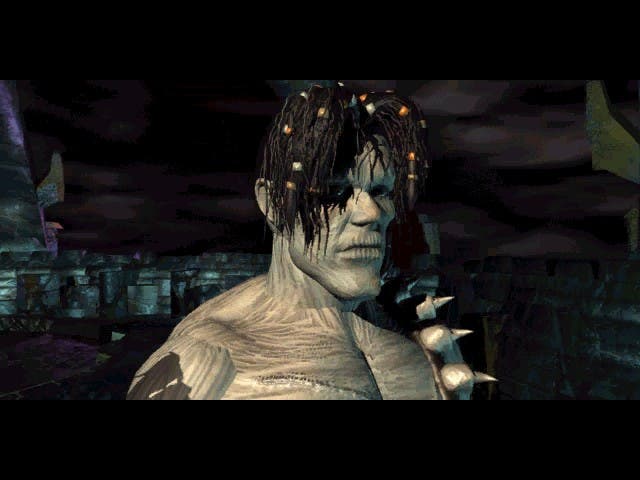
Quality Control
Unfortunately there is a major bug in the release version that makes the game totally unplayable at times. Seemingly at random the game will suddenly slow to a crawl, managing all of about one frame per second...
Sometimes it clears up by itself after a few minutes, but the only way to fix it is to leave the area and re-enter again, or to quit the game and re-load. Usually when you return the problem will have stopped, but it is frustrating to say the least, especially when it happens in the middle of a battle or important conversation.
Luckily the developers are aware of this bug and the forthcoming patch should fix it, but it is inexcusable that something so obvious should have slipped through beta testing in the first place.
The game also has a nasty tendency to unceremoniously dump you back to the Windows desktop during map changes. This is a problem I had with Baldur's Gate, and obviously it still hasn't been fixed. Thankfully it doesn't happen very often, but when it does it can be rather annoying.
On the bright side, the crashes seem to happen after the game has auto-saved, so you don't generally lose anything except the time it takes you to re-load the game, and any hair you tear out of your scalp in the process...
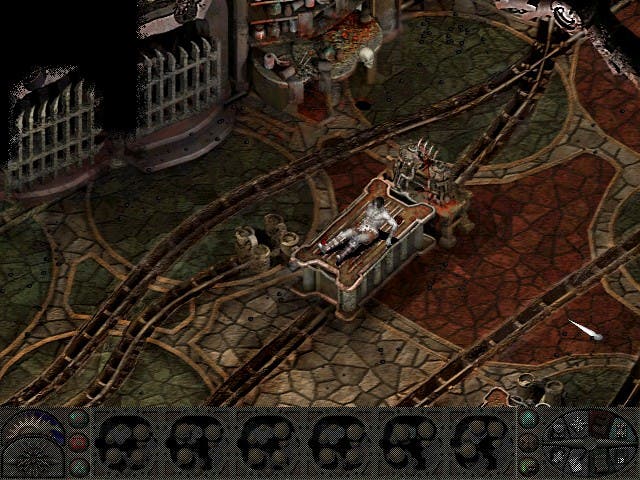
Conclusion
Planescape Torment has taken me almost two weeks of constant play to complete, and I know I missed out a lot of the side quests along the way.
This is not a game to play casually - it requires a major investment of time and effort to get anywhere. But if you're willing to give it the commitment it needs, it can soon develop into a rewarding relationship...
Unfortunately I really can't recommend the game until the patch is available. Planescape Torment is no Ultima Ascension, but it is still deeply flawed in its current state. The slowdown bug is particularly annoying, and can render the game unplayable at times.
It's also a little disappointing that the game has no multiplayer support. After all, it shares an engine with Baldur's Gate, a game which proved that co-operative multiplayer can work in an RPG.
But if you are looking for a single player computer role playing game with a difference, then once the patch is released (which should be any day now) you should definitely check this game out. It's far from perfect, and the casual way it treats death was something of a turn-off for me, but it's still about as good as they come. If nothing else, it should keep you busy until Baldur's Gate II is released!






